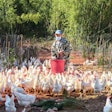
A fire caused significant damage to a Puglisi Egg Farm layer house in Middletown, Delaware, and killed nearly 200,000 birds on December 16.
According to media outlet delaware online, the Volunteer Hose Company of Middletown received a report of a brush fire close to the Puglisi egg farm.
On the way to responding to the event, additional reports were received concerning a building fire in the same area. After arriving to the burning house, multiple fire departments from Delaware and Maryland were recruited to assist putting out the fire.
The Delaware State Fire Marshal said no people were harmed during the event and the cause of the fire is still being investigated. Damages were estimated at around US$1 million.
Could smoke detectors help?
While smoke detectors are used in commercial facilities, layer houses are often too dusty to utilize standard smoke detection systems.
However, Prism Control’s ThERM system could help producers detect fire events early on in poultry houses, preventing bird loss and reducing insurance costs for the industry. The system is designed to detect smoke in layer barns and override a barn’s ventilation system when smoke is detected to prevent fueling a fire with oxygen.
The technology uses air samples to detect smoke through sensors. After detecting smoke particles, it notifies a designated farm employee with an alert and calls the local fire department. The sensors are placed strategically throughout the house in areas where fires are most likely to start, such as near heaters, motors or other electrical sources.
Unexpected validation
While the system was being validated at Center Fresh Egg Farm located in Iowa, operating under Versova Management, it detected smoke produced by the Canadian wildfires In June 2023.
One day before the alarms were triggered, the Iowa Department of Natural Resources sent out a press release describing that an approaching cold front was pulling smoke from Canadian wildfires down to ground level.
Receiving the alarm for the wildfire smoke helped confirm that the system can detect a low level of smoke and proved that very early smoke detection could work in poultry houses.

















